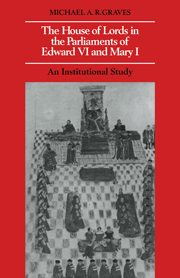Book contents
- Frontmatter
- Contents
- Dedication
- Preface
- Parliamentary sessions, 1547–8
- 1 Introduction
- 2 The composition of the House
- 3 The quality of the House
- 4 Attendance and activity, absenteeism and management
- 5 Cohesion and division
- 6 The Lords' inheritance: clerks and assistants to the House
- 7 The rules of business: procedure
- 8 The legislative record of the mid-Tudor Lords
- Abbreviations
- Appendix A Composition
- Appendix B Roll of the ‘actual’ members of the House of Lords, 1547–58
- Appendix C Attendance
- Appendix D Legislation
- Notes
- Select bibliography
- Index
Preface
Published online by Cambridge University Press: 03 May 2010
- Frontmatter
- Contents
- Dedication
- Preface
- Parliamentary sessions, 1547–8
- 1 Introduction
- 2 The composition of the House
- 3 The quality of the House
- 4 Attendance and activity, absenteeism and management
- 5 Cohesion and division
- 6 The Lords' inheritance: clerks and assistants to the House
- 7 The rules of business: procedure
- 8 The legislative record of the mid-Tudor Lords
- Abbreviations
- Appendix A Composition
- Appendix B Roll of the ‘actual’ members of the House of Lords, 1547–58
- Appendix C Attendance
- Appendix D Legislation
- Notes
- Select bibliography
- Index
Summary
This book is the belated end-product of Professor S. T. Bindoff's suggestion in 1964, when he directed me towards the mid-Tudor House of Lords. As I had been educated in the parliamentary tradition of A. F. Pollard and J. E. Neale, I made parliamentary politics my first priority. Also I initially accepted the thesis that the Commons advanced its authority, whilst the Upper House took a back seat. Consequently I approached the subject with little enthusiasm, not relishing the prospect of sifting through the sources on a parliamentary backwater. Sixteen years have changed all that. Hence the two salient characteristics of this study: that it is essentially an institutional and not a political study; and that it restores the Lords to its rightful place in the parliamentary trinity. Although this reformation of attitudes and the shift in priorities were effected in physical isolation, twelve thousand miles from the sources, that isolation was more apparent than real. For this I am deeply indebted to Professor G. R. Elton. Not only has he lent me advice and encouragement over the years but in the process both he and his wife, Sheila, have become valued friends – never more so than during my sabbatical year in Cambridge in 1979–80 when I completed this volume. Their warm hospitality will be one of my most cherished memories.
- Type
- Chapter
- Information
- The House of Lords in the Parliaments of Edward VI and Mary IAn Institutional Study, pp. vii - viiiPublisher: Cambridge University PressPrint publication year: 1981

